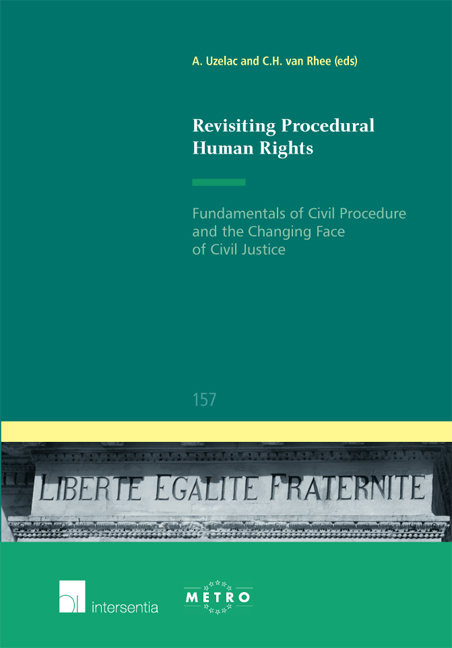 Revisiting Procedural Human Rights
Revisiting Procedural Human Rights Book contents
- Frontmatter
- Table of Contents
- List of Authors
- List of Abbreviations
- Acknowledgements
- Introduction
- The Human Right to Accessible and Foreseeable Justice
- Fundamental Procedural Rights from a National Angle
- Wheels of History: Fair Trial Rights in Historical Perspective
- Equal Justice for all: Empirical and Normative Approaches to Legal Aid and Assistance in Civil and Administrative Cases
- The Paradox of Access to Justice ‒ Empirical Research into the Attitude of the Cantonal Judge Towards Unrepresented Parties in Dutch Civil Procedure
- Access to Justice in Administrative Cases. An Analysis of Cases of the Zagreb Legal Clinic
- Are Financial Burdens Preventing Access to Justice in Southeast European Judicial Systems?
- Ius Commune Europaeum
Are Financial Burdens Preventing Access to Justice in Southeast European Judicial Systems?
from Equal Justice for all: Empirical and Normative Approaches to Legal Aid and Assistance in Civil and Administrative Cases
Published online by Cambridge University Press: 13 October 2018
- Frontmatter
- Table of Contents
- List of Authors
- List of Abbreviations
- Acknowledgements
- Introduction
- The Human Right to Accessible and Foreseeable Justice
- Fundamental Procedural Rights from a National Angle
- Wheels of History: Fair Trial Rights in Historical Perspective
- Equal Justice for all: Empirical and Normative Approaches to Legal Aid and Assistance in Civil and Administrative Cases
- The Paradox of Access to Justice ‒ Empirical Research into the Attitude of the Cantonal Judge Towards Unrepresented Parties in Dutch Civil Procedure
- Access to Justice in Administrative Cases. An Analysis of Cases of the Zagreb Legal Clinic
- Are Financial Burdens Preventing Access to Justice in Southeast European Judicial Systems?
- Ius Commune Europaeum
Summary
Introduction
Establishing and maintaining effective judicial systems with full regard for the procedural human rights and access to justice are the goals of every modern jurisdiction. The right of access to justice is granted by the provisions of the European Convention for the Protection of Human Rights and Fundamental Freedoms (ECHR) and its importance is underlined by the jurisprudence of the European Court of Human Rights (ECtHR).
The right of access to justice must be ‘practical and effective’. In order for this right of access to be effective, an individual must ‘have a clear, practical opportunity to challenge an act that is an interference with his rights’.
Since the protection of rights in democratic societies is entrusted to institutions of the judiciary, the question of the effective exercise of access to these institutions and the protection of the rights of citizens in proceedings before them is especially important when citizens are faced with excessive procedural costs.
The right of access to justice demands that the financial burden of civil justice must not form an insurmountable obstacle for exercising this right. This is even more pronounced in the context of economic crises, and the increasingly vulnerable groups of citizens in both an economic and a social sense. Therefore, economic obstacles to legal proceedings, especially for those in an economically weak position, have to be eliminated. Providing practical and effective access to justice also means taking into account the individual's capacity, as well as the individual's financial status.
Regulations on attorneys’ fees and legal aid are therefore important in the relationship between the financial burdens of civil justice and the right of access to justice. Generally, in many European countries, basic principles on attorneys’ fees exist and the remuneration has to be adequate and proportionate to the value and complexity of the case. Often hourly rates apply. In some countries, there is also the possibility of lump-sum agreements, conditional fee arrangements (‘no win, no fee’) or agreements ‘paid on result’. In order to preserve the right of access to justice, furthermore, countries are establishing a system of legal aid. But the statutory conditions that the applicant for legal aid must meet to prove his or her financial status may present a serious obstacle in attaining timely and effective legal assistance.
- Type
- Chapter
- Information
- Revisiting Procedural Human RightsFundamentals of Civil Procedure and the Changing Face of Civil Justice, pp. 317 - 336Publisher: IntersentiaPrint publication year: 2017


